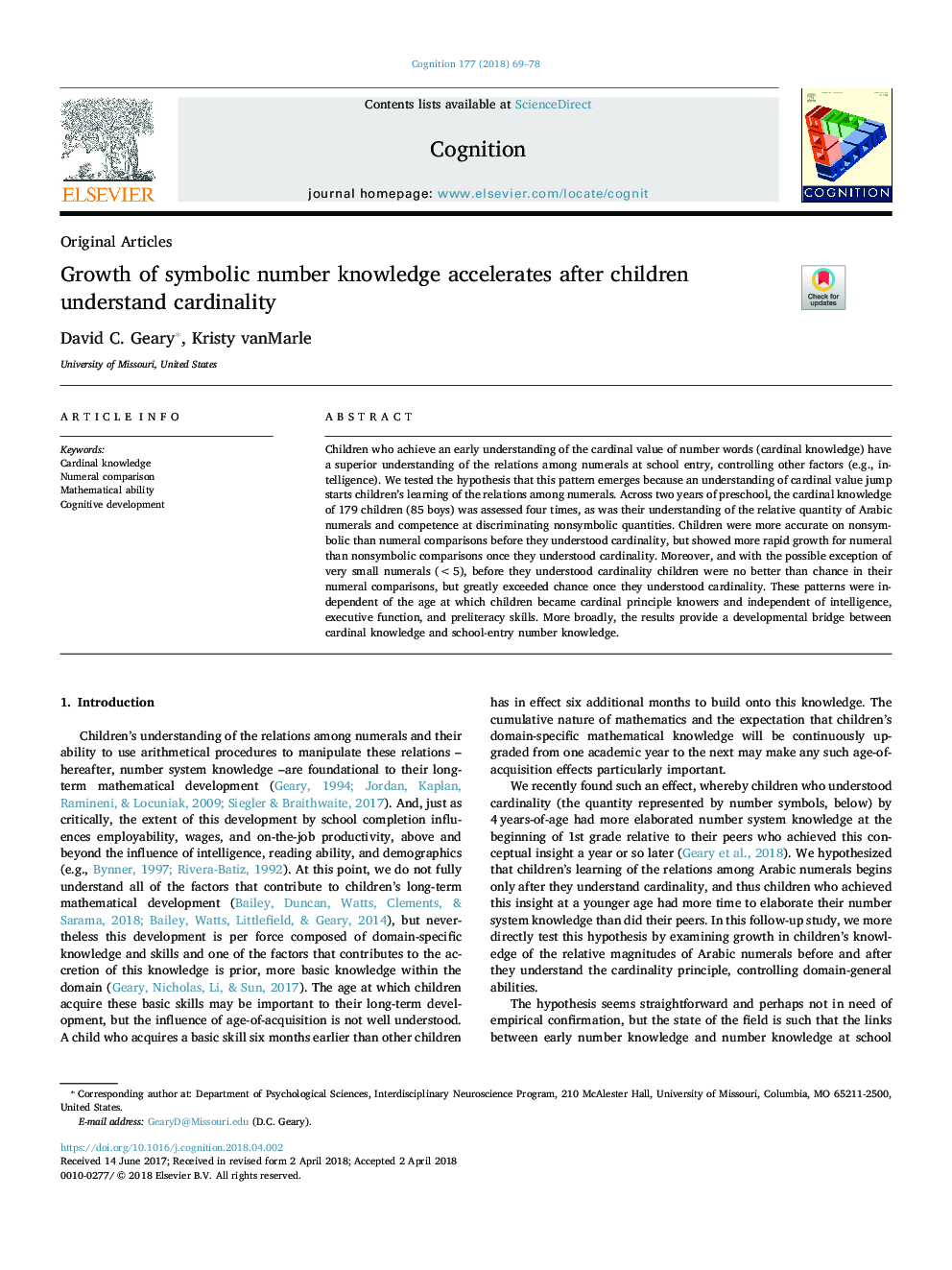| کد مقاله | کد نشریه | سال انتشار | مقاله انگلیسی | نسخه تمام متن |
|---|---|---|---|---|
| 7285274 | 1474090 | 2018 | 10 صفحه PDF | دانلود رایگان |
عنوان انگلیسی مقاله ISI
Growth of symbolic number knowledge accelerates after children understand cardinality
ترجمه فارسی عنوان
رشد دانش تعداد نمادین پس از آنکه کودکان توانایی شناخت را افزایش می دهند، تسریع می شود
دانلود مقاله + سفارش ترجمه
دانلود مقاله ISI انگلیسی
رایگان برای ایرانیان
کلمات کلیدی
دانش کاردینال، مقایسه عدد، توانایی ریاضی، توسعه شناختی،
ترجمه چکیده
کودکانی که به درک زود هنگام از ارزش کلیدی کلمات شمارنده (دانش کاردینال) دست می یابند، درک مفیدی از روابط عادی در ورود مدرسه و کنترل عوامل دیگر (مثلا هوش) دارند. فرضیه ما این فرضیه را ترسیم کرد که این الگو ظاهر می شود، زیرا درک پرستی ارزش هستی، یادگیری کودکان از روابط بین اعداد را آغاز می کند. در طول دو سال پیش از دبستان، دانش 179 کودک (85 پسر) دانشمند اصلی چهار بار مورد ارزیابی قرار گرفت و درک آنها از میزان نسبی اعداد عربی و صلاحیت در تفسیر مقادیر غیرواقعی بود. کودکان قبل از اینکه بتوانند قدرت را درک کنند، دقت بیشتری نسبت به مقایسه های عددی نداشتند، اما در مقایسه با مقادیر غیررسمی، سریعتر رشد کرد. علاوه بر این، و با استثناء ممکن از اعداد بسیار کوچک (5)، قبل از اینکه بتوانند کاردینال را درک کنند، فرزندان نسبت به شانس در مقایسه های عددی شان بهتر از حد انتظار نیستند، اما وقتی که آنها توانایی را می فهمیدند، از احتمال بیشتر فراتر رفتند. این الگوها مستقل از زمانی بود که کودکان دانش آموزان اصلی و مستقل از هوش، عملکرد اجرایی و مهارت های مقدماتی بودند. به طور گسترده تر، نتایج، یک پل توسعه بین دانش دانش و دانش مدرسه را فراهم می کند.
موضوعات مرتبط
علوم زیستی و بیوفناوری
علم عصب شناسی
علوم اعصاب شناختی
چکیده انگلیسی
Children who achieve an early understanding of the cardinal value of number words (cardinal knowledge) have a superior understanding of the relations among numerals at school entry, controlling other factors (e.g., intelligence). We tested the hypothesis that this pattern emerges because an understanding of cardinal value jump starts children's learning of the relations among numerals. Across two years of preschool, the cardinal knowledge of 179 children (85 boys) was assessed four times, as was their understanding of the relative quantity of Arabic numerals and competence at discriminating nonsymbolic quantities. Children were more accurate on nonsymbolic than numeral comparisons before they understood cardinality, but showed more rapid growth for numeral than nonsymbolic comparisons once they understood cardinality. Moreover, and with the possible exception of very small numerals (<5), before they understood cardinality children were no better than chance in their numeral comparisons, but greatly exceeded chance once they understood cardinality. These patterns were independent of the age at which children became cardinal principle knowers and independent of intelligence, executive function, and preliteracy skills. More broadly, the results provide a developmental bridge between cardinal knowledge and school-entry number knowledge.
ناشر
Database: Elsevier - ScienceDirect (ساینس دایرکت)
Journal: Cognition - Volume 177, August 2018, Pages 69-78
Journal: Cognition - Volume 177, August 2018, Pages 69-78
نویسندگان
David C. Geary, Kristy vanMarle,
